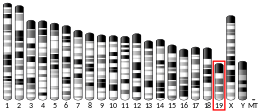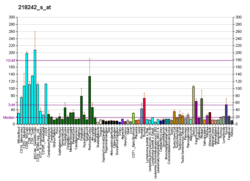KMT5B
Appearance
Histone-lysine N-methyltransferase KMT5B is an enzyme that in humans is encoded by the KMT5B gene.[5][6][7] The enzyme along with WHSC1 is responsible for dimethylation of lysine 20 on histone H4 in mouse and humans.[8][9]
This gene encodes a protein that contains a SET domain. SET domains appear to be protein-protein interaction domains that mediate interactions with a family of proteins that display similarity with dual-specificity phosphatases (dsPTPases). Two alternatively spliced transcript variants have been found for this gene.[7]
Role in pathology
[edit]Mutations of the KMT5B gene cause autosomal dominant intellectual developmental disorder 51, a condition first described in 2017 by Stessman et al.[10]
References
[edit]- ^ a b c GRCh38: Ensembl release 89: ENSG00000110066 – Ensembl, May 2017
- ^ a b c GRCm38: Ensembl release 89: ENSMUSG00000045098 – Ensembl, May 2017
- ^ "Human PubMed Reference:". National Center for Biotechnology Information, U.S. National Library of Medicine.
- ^ "Mouse PubMed Reference:". National Center for Biotechnology Information, U.S. National Library of Medicine.
- ^ Lai CH, Chou CY, Ch'ang LY, Liu CS, Lin W (Aug 2000). "Identification of Novel Human Genes Evolutionarily Conserved in Caenorhabditis elegans by Comparative Proteomics". Genome Res. 10 (5): 703–13. doi:10.1101/gr.10.5.703. PMC 310876. PMID 10810093.
- ^ Twells RC, Metzker ML, Brown SD, Cox R, Garey C, Hammond H, Hey PJ, Levy E, Nakagawa Y, Philips MS, Todd JA, Hess JF (Jun 2001). "The sequence and gene characterization of a 400-kb candidate region for IDDM4 on chromosome 11q13". Genomics. 72 (3): 231–42. doi:10.1006/geno.2000.6492. PMID 11401438.
- ^ a b "KMT5B lysine methyltransferase 5B [ Homo sapiens (human) ]".
- ^ Schotta G, Sengupta R, Kubicek S, Malin S, Kauer M, Callén E, Celeste A, Pagani M, Opravil S, De La Rosa-Velazquez IA, Espejo A, Bedford MT, Nussenzweig A, Busslinger M, Jenuwein T (2008). "A chromatin-wide transition to H4K20 monomethylation impairs genome integrity and programmed DNA rearrangements in the mouse". Genes Dev. 22 (15): 2048–61. doi:10.1101/gad.476008. PMC 2492754. PMID 18676810.
- ^ Pei H, Zhang L, Luo K, Qin Y, Chesi M, Fei F, Bergsagel PL, Wang L, You Z, Lou Z (2011). "MMSET regulates histone H4K20 methylation and 53BP1 accumulation at DNA damage sites". Nature. 470 (7332): 124–8. Bibcode:2011Natur.470..124P. doi:10.1038/nature09658. PMC 3064261. PMID 21293379.
- ^ Stessman HA, Xiong B, Coe BP, Wang T, Hoekzema K, Fenckova M, Kvarnung M, Gerdts J, Trinh S, Cosemans N, Vives L, Lin J, Turner TN, Santen G, Ruivenkamp C, Kriek M, van Haeringen A, Aten E, Friend K, Liebelt J, Barnett C, Haan E, Shaw M, Gecz J, Anderlid BM, Nordgren A, Lindstrand A, Schwartz C, Kooy RF, Vandeweyer G, Helsmoortel C, Romano C, Alberti A, Vinci M, Avola E, Giusto S, Courchesne E, Pramparo T, Pierce K, Nalabolu S, Amaral DG, Scheffer IE, Delatycki MB, Lockhart PJ, Hormozdiari F, Harich B, Castells-Nobau A, Xia K, Peeters H, Nordenskjöld M, Schenck A, Bernier RA, Eichler EE (April 2017). "Targeted sequencing identifies 91 neurodevelopmental-disorder risk genes with autism and developmental-disability biases". Nature Genetics. 49 (4): 515–526. doi:10.1038/ng.3792. PMC 5374041. PMID 28191889.
Further reading
[edit]- Maruyama K, Sugano S (1994). "Oligo-capping: a simple method to replace the cap structure of eukaryotic mRNAs with oligoribonucleotides". Gene. 138 (1–2): 171–4. doi:10.1016/0378-1119(94)90802-8. PMID 8125298.
- Bonaldo MF, Lennon G, Soares MB (1997). "Normalization and subtraction: two approaches to facilitate gene discovery". Genome Res. 6 (9): 791–806. doi:10.1101/gr.6.9.791. PMID 8889548.
- Suzuki Y, Yoshitomo-Nakagawa K, Maruyama K, et al. (1997). "Construction and characterization of a full length-enriched and a 5'-end-enriched cDNA library". Gene. 200 (1–2): 149–56. doi:10.1016/S0378-1119(97)00411-3. PMID 9373149.
- Strausberg RL, Feingold EA, Grouse LH, et al. (2003). "Generation and initial analysis of more than 15,000 full-length human and mouse cDNA sequences". Proc. Natl. Acad. Sci. U.S.A. 99 (26): 16899–903. Bibcode:2002PNAS...9916899M. doi:10.1073/pnas.242603899. PMC 139241. PMID 12477932.
- Ota T, Suzuki Y, Nishikawa T, et al. (2004). "Complete sequencing and characterization of 21,243 full-length human cDNAs". Nat. Genet. 36 (1): 40–5. doi:10.1038/ng1285. PMID 14702039.
- Gerhard DS, Wagner L, Feingold EA, et al. (2004). "The Status, Quality, and Expansion of the NIH Full-Length cDNA Project: The Mammalian Gene Collection (MGC)". Genome Res. 14 (10B): 2121–7. doi:10.1101/gr.2596504. PMC 528928. PMID 15489334.
- Tryndyak VP, Kovalchuk O, Pogribny IP (2006). "Loss of DNA methylation and histone H4 lysine 20 trimethylation in human breast cancer cells is associated with aberrant expression of DNA methyltransferase 1, Suv4-20h2 histone methyltransferase and methyl-binding proteins". Cancer Biol. Ther. 5 (1): 65–70. doi:10.4161/cbt.5.1.2288. PMID 16322686. S2CID 12268423.
- Ewing RM, Chu P, Elisma F, et al. (2007). "Large-scale mapping of human protein–protein interactions by mass spectrometry". Mol. Syst. Biol. 3 (1): 89. doi:10.1038/msb4100134. PMC 1847948. PMID 17353931.





